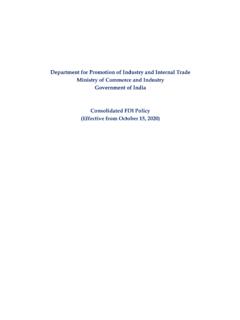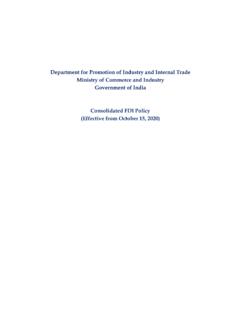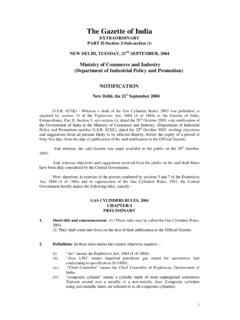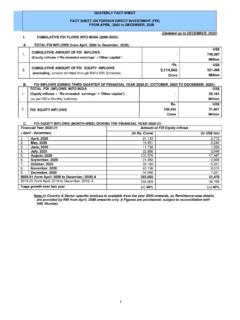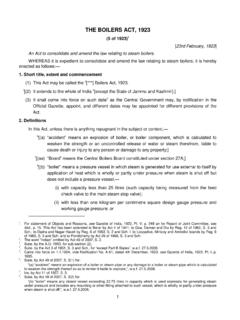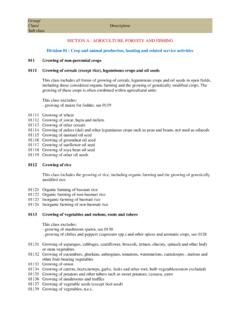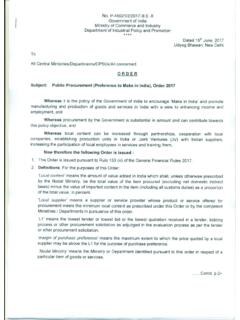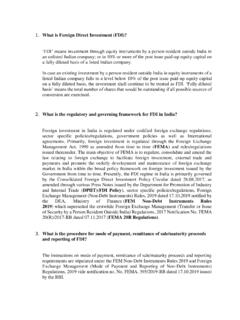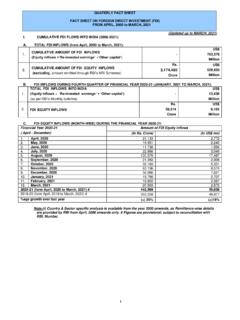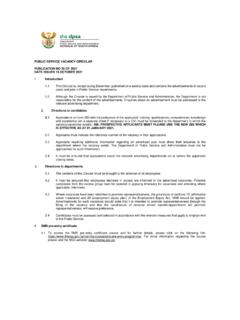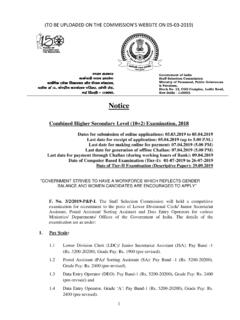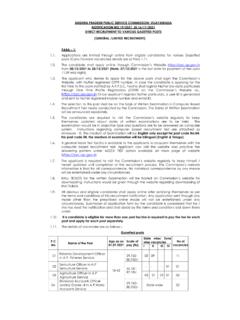Transcription of FREQUENTLY ASKED QUESTIONS BY APPLICANTS FOR …
1 FREQUENTLY ASKED QUESTIONS BY APPLICANTS FOR GRANT OF INDUSTRIAL LICENSE Q. For what items is Industrial License is required? A. Licensing is done under Industries (Development & Regulation) Act 1951. Post 1991 de-licensing, presently only five industries are under compulsory licensing : Electronic aerospace and defence equipment Industrial explosives including detonating fuses, safety fuses, gun powder, nitrocellulose and matches Cigars and cigarettes of tobacco and manufactured tobacco substitutes [Fresh Licenses are not being granted for manufacture of this item on health grounds since 1999] Specified hazardous chemicals (i) hydrocyanic acid and its derivatives (ii) Phosgene and its derivatives and (iii) Isocyanates & disocyanates of hydrocarbon not elsewhere specified (example methyl Isocynate)
2 Distillation and brewing of alcoholic drinks [Licensing ceased by DIPP in compliance with Supreme Court Order dated 29/01/1997 in Bihar Distillery Case which ruled that industries engaged in manufacture of potable alcohol would be under the jurisdiction of the states] In addition to above, a non MSME unit manufacturing items reserved for MSME Q. Whether an Industrial license is required by any non-MSME unit manufacturing items reserved for MSME sector? A. Presently, there are 20 items which are exclusively reserved for manufacture for MSME sector. Any non-MSME unit desirous of manufacturing these items, need an IL which is issued with an obligation to export 50% of the new additional annual production to be achieved within a maximum period of three years.
3 Q What is the policy relating to the Small Scale Units who cross the investment limits prescribed for them? A Small scale/ ancillary industrial under-takings engaged in the manufacture of any item(s) reserved for small scale/ ancillary sector, on crossing the investment limits prescribed for them will be required to obtain a Carry on Business (COB) license from the concerned Administrative Ministry. Q. What is the Foreign Direct Investment(FDI) Policy in defence Sector? A. FDI Policy in defence Sector is as follows:- 49% FDI is allowed in defence Industry under Government route, subject to Industrial license under the Industries (Development & Regulation) Act, 1951 Above 49% FDI is allowed with the approval of Cabinet Committee on Security (CCS) on case to case basis, wherever it is likely to result in access to modern and state-of-art technology in the country.
4 FDI limit of 49% is composite and includes all kinds of foreign investments Foreign Direct Investment (FDI), Foreign Institutional Investors (FIIs), Foreign Portfolio Investors (FPIs), Non Resident Indians (NRIs), Foreign Venture Capital Investors (FVCI) and Qualified Foreign Investors (QFIs) regardless of whether the said investments have been made under Schedule 1 (FDI), 2(FII), 2A(FPI), 3 (NRI), 6(FVCI) and 8 (QFI) of FEMA (Transfer or Issue of Security by Persons Resident Outside India) Regulations Portfolio investment by FPIs/FIIs/NRIs/QFIs and investments by FVCI is together will not exceed 24% of the total equity of the investee/ joint venture company. Portfolio investments will be under automatic route.
5 Q Is there any list of items, which categorizes the defence items for which IL application can be filed? A A List of defence Products, prepared by department of defence Production, Ministry of defence has been issued vide Press Note No. 3 (2014 series), which is available on DIPP s website for guidance to the entrepreneurs. Q For manufacture of which items in the defence sector, would an Industrial License be required? A The Industrial License will be required for manufacture of those defence items which have been mentioned in the 3rd Column of the annexure to the Press Note No. 3 (2014 Series) dated 26/06/2014. The following items would not require Industrial License: Dual use items, having military as well as civilian applications Items/ parts/ components/ castings/ forgings/ test equipments, which are not part of the defence products list issued vide Press Note 3 (2014 Series) Q What is the Ministry of defence s Policy relating to Dual Items?
6 A department of defence Production, Ministry of defence has clarified that dual use items, having military as well as civilian applications, other than those specially mentioned in the defence Product list issued vide Press Note No. 3 (2014 series), would not require Industrial License from defence angle. Q Whether Industrial License is required for manufacture of Civil Aerospace Items? A Manufacture of items for Civil Aerospace is under compulsory licensing. Industrial license for manufacture of such items is issued on the recommendations of department of defence Production, Ministry of defence . Q Is there any clarification regarding Indian Offset Partner (IOP)?
7 A D/o defence Production has clarified that the Indian Offset Partner shall, besides any other regulations in force, also comply with the guidelines/ licensing requirements stipulated by the DIPP as applicable Possession of defence industrial license, is not a pre-requisite for becoming an IOP and it is mandatory only if it is required under the licensing requirements/guidelines issued by DIPP. Q. Is IL needed to fulfill offset obligations? A There are some items for which IL was given by DIPP earlier but not any more. IL is needed only for the items covered under defence List. The defence List is available at the DIPP website for guidance to the entrepreneurs. Q. How do we convince Offset Partners ? A A List of defence Products, prepared by department of defence Production, Ministry of defence has been uploaded on the DIPP s website for guidance to the entrepreneurs.
8 Industrial License is required only for the items covered under defence List. Q What is the policy relating to licensing for EoU Units or Units in SEZ Area? A department of Commerce will consider the Licensing applications for EoU Units or Units located in SEZ area. Q. What is the policy relating to the Extension of Validity of Industrial License ? Initial validity of an Industrial License, will be for a period of three years. The Licensee has to submit progress report (form G ) on six monthly basis, until commencement of commercial production. (Form G is provided with the Industrial License) If the licensee commences the commercial production within validity period, there is no need for applying for extension of validity.
9 In case, the licensee fails to commence commercial production within initial validity period, they may directly apply to the concerned Administrative Ministry for extension of validly of their Industrial License, as the extension of validity of IL is processed by the concerned Administrative Ministry. The licensee can apply twice, for extension of validity for a period of two years each. The total period of validity of the Industrial license will be seven years, within which the commercial production has to commence. In case the commercial production is not commenced within this period the license would be rendered invalid. Q Will the guidelines mentioned in Press Note (2014 series) regarding Extension of Validity be applicable from prospective effect 2nd July 2014 or are also applicable to the licenses issued prior to the issue of Press Note (2014 series).
10 A The validity of all Industrial Licenses has been increased to three years, whether issued before or after 2nd July 2014. The licensee has to apply for extension of validity after three years, as applicable. Q. Whether partial commencement of production, if the licensee commences the production of one of the many items covered under Industrial License, will be treated as commencement of commercial production? A. The partial commencement of commercial production is accepted as the commencement of commercial production in respect of the entire Industrial License. Q Is there any procedure relating to change of owner of the Registered Industrial Undertaking who has been granted an Industrial License?
